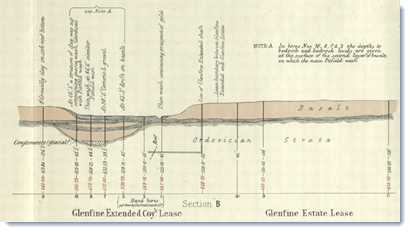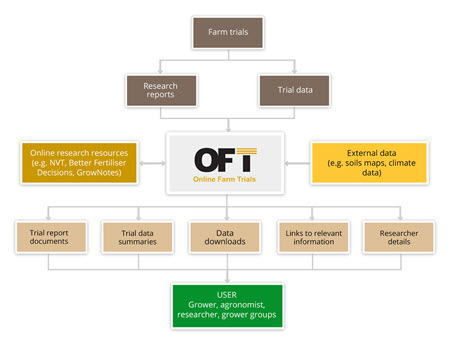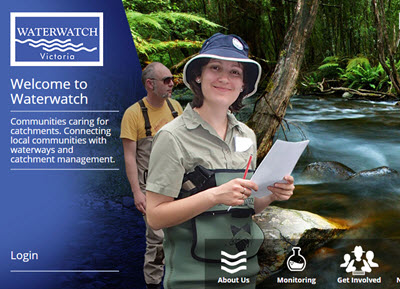
Data Discovery
Two key facilitators for CeRDI research discoveries in data centre on: 1) maximising the exploration and analysis by CeRDI discipline experts of available research-ready data sets; and, 2) expanding, through the mechanism of crowdsourcing and citizen science, the scope of new data included within each spatial knowledge initiative.
Research-ready data sets
Interoperable data federation creates new data sets that were previously inaccessible or in some cases unrecognised. The federation of a range of previously disparate data sets and the establishment of visualisation capacity for this data has enhanced the ability to answer a broader range of research questions. The identification and analysis of data that has historically been hidden to research is a major development in data research. The fact that exploration of new research ready data sets can occur across a range of discipline areas further enhances the benefits of technological innovation.
Importantly, it allows for the exploration of discipline specific data sets, as well as the examination of each field of study through the cross-disciplinary lens.
To illustrate how research capacity is being strengthened through the creation of research ready data sets across and within disciplinary areas, and within, the following examples taken from Historic Urban Landscape and Online Farm Trials are provided:
Historic Urban Landscape (HUL) - A series of place specific data sets have been collected as part of the building of the HUL and Visualising Ballarat portals. These include data relating to urban planning, information relating to the vistas, sights, sounds and memories that are intangible (and previously hidden) but define individual communities, heritage overlays, landscape data for parks and recreation. The ability to federate these disparate pools of data allows both discipline specific and cross-disciplinary research. An example of using historical and contemporary data for discipline specific knowledge building would be the capacity to ask the following research question: How has urban drainage infrastructure shifted over time and how are shifts impacting on flooding trends and water catchment? Applying a cross-disciplinary lens, using the same federated data, increases the capacity to answer previously unanswerable questions such as: What is the connection between the availability of parks, recreation and infrastructure to levels of community connection and safety indicators across socio economic groupings? What have been the shifts in infrastructure across local government areas and what have been the environmental impacts of these location specific shifts? These are cross-disciplinary issues that have merged increasingly through the mechanism of federation of diverse data sets.
Online Farm Trials (OFT) - This research is supporting the collection and online publishing of farm trial results across field test sites and across grower groups nationally. The establishment of OFT allows, for the first time, comparative analysis of trials to occur across sites, across locations and across different timeframes. The availability of this resource, in addition to facilitating farm planning and crop management for end users, allows the CeRDI team to access research ready data sets to ask questions such as: What are the consistent trends in different types of fertiliser application, across geographical locations for soil amelioration? What social impact does effective precision agriculture have on farm communities experiencing economic disadvantage? Again these questions are both discipline specific and cross-disciplinary in nature.
The second area of new research discoveries in which CeRDI is taking a lead role is in the area of crowdsourcing data through citizen science.
Crowd sourcing and citizen science
The role of crowdsourcing as an emergent technique for data generation by citizen scientists through the mechanism of technological innovation is gaining significant leverage within government and research communities. The capacity to empower the citizen as active, on the ground participants in data collection, to rewrite their relationships with
government and industry and to use the data gathered through this means for research, planning and development is increasingly viewed as an integral part of discovery processes (Bonney et al., 2009a; 2009b; Craglia & Shanley, 2015; Mandarin, 2015a; 2015b). The new information and insights that can emerge through crowdsourcing provides a wealth of previously unavailable data (due to factors such as scarcity of resourcing for data collection by paid researchers, lack of capacity to identify all stakeholders when undertaking formal research planning and the fact that legacy data is often held by citizens that were previously excluded from the data collection process). Examples of the ways in which CeRDI uses crowdsourcing for data discovery research are outlined in the following portal examples for Visualising Victoria's Groundwater (VVG) and for Natural Resource Management Portal (NRM Portal).
Visualising Victoria's Groundwater (VVG) federates a wide range of data sets relating to groundwater across Victoria. It provides data on a range of groundwater issues including bore location, history, depth, water quality and salinity. Since establishment, VVG has had an increasing level of user feedback relating to the accuracy or scope of information contained on the site. This has enabled new data to be added, or existing data to be modified in a way that would not have been possible without crowdsourcing input. As a result of localised knowledge, modifications in data have been possible and these have informed subsequent shifts in groundwater data sets. These shifts have been catalogued and included in existing data sets allowing correction of data sets to occur while allowing CeRDI researchers (and key industry stakeholders such as water authorities) to access information that was previously excluded; this adds a significant new dimension to research endeavours on Victoria's groundwater.
The Corangamite NRM brings together a range of data relating to natural resource management (specifically for catchment management), with a key feature of the portal being the capacity for crowd-sourcing to track Landcare activities and environmental management progression across a range of local areas. Core data in the portal is provided by Landcare groups as map layers of their project activity and priorities for future works and engagement. The portal specifically allows uploading of information by the citizen. Knowledge compiled in the portal will assist CeRDI researchers to undertake new discovery research at local and landscape scales-locational. The types of questions that can now be explored include: How effective have Landcare initiatives been in shifting community perceptions and responses to environmental management? What Landcare initiatives are most likely to have benefits for environmental health and sustainability? What interventions, when overlaid with location specific characteristics, have maximised synergy in approaches for shifting environmental health outcomes? What land characteristics, across locations, are effective measures in the improvement of soil health?
CeRDI is in a unique position to achieve data discovery research outcomes that will provide new insights for discipline-specific research, for cross-disciplinary research and for providing research knowledge of relevance to national and international funders, research groups and corporations.
Examples
Digitisation of historical bore records
 At the request of the VVG project, the State Library of Victoria
At the request of the VVG project, the State Library of Victoria ![]() (SLV) digitised the records of Victorian Government drilling from 1879 to 1965 - known as the Boring Records. More details about the Victorian Government drilling program in general is on the VVG History
(SLV) digitised the records of Victorian Government drilling from 1879 to 1965 - known as the Boring Records. More details about the Victorian Government drilling program in general is on the VVG History ![]() web page.
web page.
Online Farm Trials Research
 Supported by the Grains Research and Development Corporation (GRDC)
Supported by the Grains Research and Development Corporation (GRDC) ![]() , the Online Farm Trials (OFT)
, the Online Farm Trials (OFT) ![]() project uses the latest technology to improve access to farm trial research in the Australian grains industry.
project uses the latest technology to improve access to farm trial research in the Australian grains industry.
This diagram demonstrates how the OFT project brings trial information and data together to underpin research discovery.
Citizen Science
 How does Waterwatch Victoria support the collection of credible data?
How does Waterwatch Victoria support the collection of credible data?
The Waterwatch Victoria ![]() Data Confidence framework informs users of Waterwatch data of the breadth of monitoring purposes across the program. It is designed to introduce users of data to the wide range of monitoring purposes.
Data Confidence framework informs users of Waterwatch data of the breadth of monitoring purposes across the program. It is designed to introduce users of data to the wide range of monitoring purposes.
